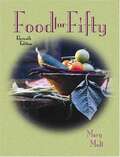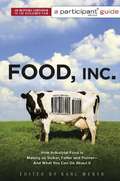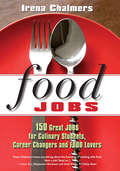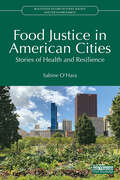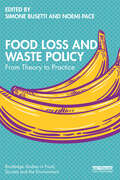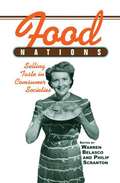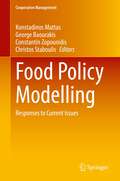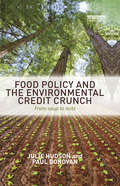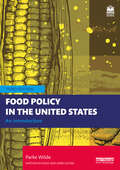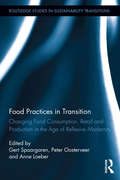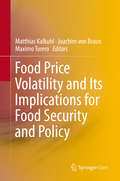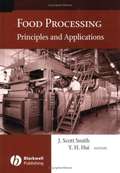- Table View
- List View
Food Fights: International Regimes and the Politics of Agricultural Trade Disputes (Routledge Revivals)
by Renée Marlin-BennettFirst published in 1993, this title explores the underlying ideologies and decision-making procedures that codify the rules of the post-World War II liberal, now defunct Soviet socialist, mercantilist and South preferential trade regimes. Food Fights presents a rich case study and rigorous data analysis of organised agrictultural trade that uncovers similarities between these diverse economic systems and identifies the principle trends governing the new global economy.
Food For Fifty
by Mary K. MoltFor courses in Quantity Food Production and Foodservice Management. <p><p> THE resource--for over 65 years--for students and professionals in quantity food production and foodservice management. Exceptionally comprehensive, this classic text/reference provides basic technical food production information; offers a wealth of high-quality, standardized, quantity recipes applicable to most types of foodservices; and clearly explains the full range of generally accepted procedures and techniques involved in quantity food preparation. Very contemporary in perspective, it provides a host of “new tools” for helping food professionals and students meet quickly changing dining trends and satisfy the expectations of today's customer.
Food For Today (8th edition)
by Helen Kowtaluk Alice Orphanos KopanThis leading program goes beyond the basics of nutrition, consumer skills, and food preparation to include current coverage of Food Science, Global Foods, Safety, Wellness, and more.
Food Futures in Education and Society (Routledge Studies in Food, Society and the Environment)
by Angela Turner Gurpinder Singh Lalli Marion RutlandThis book brings together a unique collection of chapters to facilitate a broad discussion on food education that will stimulate readers to think about key policies, recent research, curriculum positions and how to engage with key stakeholders about the future of food. Food education has gained much attention because the challenges that influence food availability and eating in schools also extend beyond the school gate. Accordingly, this book establishes evidence-based arguments that recognise the many facets of food education, and reveal how learning through a future's lens and joined-up thinking is critical for shaping intergenerational fairness concerning food futures in education and society. This book is distinctive through its multidisciplinary collection of chapters on food education with a particular focus on the Global North, with case studies from England, Australia, the Republic of Ireland, the United States of America, Canada and Germany. With a focus on three key themes and a rigorous food futures framework, the book is structured into three sections: (i) food education, pedagogy and curriculum, (ii) knowledge and skill diversity associated with food and health learning and (iii) food education inclusivity, culture and agency. Overall, this volume extends and challenges current research and theory in the area of food education and food pedagogy and offers insight and tangible benefits for the future development of food education policies and curricula. This book will be of great interest to students, scholars, policymakers and education leaders working on food education and pedagogy, food policy, health and diet and the sociology of food.
Food Inc.: How Industrial Food is Making Us Sicker, Fatter, and Poorer-And What You Can Do About It
by Karl WeberFood, Inc. is guaranteed to shake up our perceptions of what we eat. This powerful documentary deconstructing the corporate food industry in America was hailed by Entertainment Weekly as “more than a terrific movie—it’s an important movie.” <P><P> Aided by expert commentators such as Michael Pollan and Eric Schlosser, the film poses questions such as: Where has my food come from, and who has processed it? What are the giant agribusinesses and what stake do they have in maintaining the status quo of food production and consumption? How can I feed my family healthy foods affordably?<P> Expanding on the film’s themes, the book Food, Inc. will answer those questions through a series of challenging essays by leading experts and thinkers. This book will encourage those inspired by the film to learn more about the issues, and act to change the world.
Food Industry 4.0: Unlocking Advancement Opportunities in the Food Manufacturing Sector
by Dr Wayne Martindale Dr Linh Duong Dr Sandeep JagtapThis book provides industry insights and fresh ideas for the advancement of the most vital global industry - food. Drawing on their industry and academic expertise the authors have identified three controlling aspects of food business operations that can unleash long term success: consumer health and wellbeing; product and process sustainability; and harnessing advances in digitalization.. If developed to their maximum potential these factors have the capability to revolutionize the food sector. Food Industry 4.0 highlights advancement opportunities for the food manufacturing sector, including innovation in products, processes and services, as it seeks to combine productive, efficient and sustainable practices. The contents address: Mapping data, new approaches for food system applications. The perfect meal and making a balanced global diet possible. Industry 4.0 applications in the food sector: robotics and automation, big data, Internet of Things, cybersecurity. Resource utilization in the food manufacturing sector. Resilience and sustainability in food supply chains. Environmental and social governance in our food system. It is of significant benefit to food industry practitioners working in operational and product development roles, academic researchers, policy makers, students, and food sector professionals.
Food Insecurity Among Members of the Armed Forces and Their Dependents
by Beth J. Asch Thomas E. Trail Stephanie Rennane Lisa Berdie Jason M. Ward Dina Troyanker Catria Gadwah-Meaden Jonas KempfThe National Defense Authorization Act for fiscal year 2020 directed the Secretary of Defense to report on food insecurity among members of the armed forces and their dependents. RAND researchers examined the eight elements from the directive (including an assessment of the current extent of food insecurity among service members and their dependents) and developed answers, along with listing areas requiring additional analysis.
Food Jobs: 150 Great Jobs For Culinary Students, Career Changers And Food Lovers
by Irena ChalmersDo you want to turn your passion for food into a career? Take a bite out of the food world with help from the experts in this first-of-its-kind What Color Is Your Parachute? for food related careers.Maybe you're considering culinary school, maybe you're about to graduate, or maybe you're looking for an exciting career change. How can you translate your zest for flavor into a satisfying profession? Should you become a chef or open a specialty foods shop, write cookbooks or try your hand at food styling? Culinary careers are as varied as they are fascinating-the only challenge is deciding which one is right for you. Filled with advice from food-world pros including luminaries such as Alice Waters, Chris Kimball, Betty Fussell and Darra Goldstein Food Jobs will set you behind the stove of your dream career.Chalmers provides essential information for getting started including testimonials from the best in the field (Bobby Flay, Todd English, Gordon Hamersly, Francois Payard, Danny Meyer, Anthony Bourdain and more).
Food Justice
by Robert Gottlieb Anupama JoshiIn today's food system, farm workers face difficult and hazardous conditions,low-income neighborhoods lack supermarkets but abound in fast-food restaurants and liquor stores,food products emphasize convenience rather than wholesomeness, and the international reach ofAmerican fast-food franchises has been a major contributor to an epidemic of "globesity. "To combat these inequities and excesses, a movement for food justice has emerged in recent yearsseeking to transform the food system from seed to table. In Food Justice, RobertGottlieb and Anupama Joshi tell the story of this emerging movement. A foodjustice framework ensures that the benefits and risks of how food is grown and processed,transported, distributed, and consumed are shared equitably. Gottlieb and Joshi recount the historyof food injustices and describe current efforts to change the system, including community gardensand farmer training in Holyoke, Massachusetts, youth empowerment through the Rethinkers in NewOrleans, farm-to-school programs across the country, and the Los Angeles school system's eliminationof sugary soft drinks from its cafeterias. And they tell how food activism has succeeded at thehighest level: advocates waged a grassroots campaign that convinced the Obama White House to plant avegetable garden. The first comprehensive inquiry into this emerging movement, FoodJustice addresses the increasing disconnect between food and culture that has resultedfrom our highly industrialized food system.
Food Justice in American Cities: Stories of Health and Resilience (Routledge Studies in Food, Society and the Environment)
by Sabine O’HaraThis book documents food insecurity in urban communities across the United States and asks whether emerging urban food and agriculture initiatives can address the food security needs of American city dwellers. While America has sufficient food to feed its entire population, 38 million people are food insecure, with urban communities and communities of color having long borne the brunt of food inequalities. This book traces the evolving story of food by describing the people behind food system statistics, focusing on cities and suburban communities across America. In doing so, it raises questions not only about food security but about a food economy that can foster justice and sustainability and combat hunger and waste. By linking human faces to the data, the book reveals the many connections between food insecurity and unsustainable practices. The book concludes by discussing some of the pathways toward a more sustainable and just food system by linking the food system to the larger economy and the many sectors that are connected to food. Because of these multifaceted connections, food can be a unique catalyst for creating pathways toward a more just and sustainable economy that is more aligned with nature. This book will be of great interest to students and scholars of food justice, food security, urban food and agriculture, urban sustainability, and sustainable food systems more broadly.
Food Justice in US and Global Contexts
by Ian Werkheiser Zachary PisoThis book offers fresh perspectives on issues of food justice. The chapters emerged from a series of annual workshops on food justice held at Michigan State University between 2013 and 2015, which brought together a wide variety of interested people to learn from and work with each other. Food justice can be studied from such diverse perspectives as philosophy, anthropology, economics, gender and sexuality studies, geography, history, literary criticism, philosophy and sociology as well as the human dimensions of agricultural and environmental sciences. As such, interdisciplinary workshops are a much-needed vehicle to improve our understanding of the subject, which is at the center of a vibrant and growing discourse not only among academics from a wide range of disciplines but also among policy makers and community activists. The book includes their perspectives, offering a wide range of approaches to and conceptions of food justice in a variety of contexts. This invaluable work requires readers to cross boundaries and be open to new ideas based on different assumptions.
Food Loss and Waste Policy: From Theory to Practice (Routledge Studies in Food, Society and the Environment)
by Simone Busetti Noemi PaceThis book examines policy responses to food waste and loss, an issue of significant, global concern, with one-third of food produced for human consumption lost or wasted. Investigating food waste and loss under an interdisciplinary lens, the contributors employ a variety of methodological approaches, including quantitative and qualitative techniques, drawing on in-depth case studies and action research. The volume is organised into four parts: Understanding Food Loss and Waste, International Programmes, National Policies and Local Initiatives. The first part introduces the reader to the concept of food loss and waste, how it can be measured, its causes and consequences, and how it can be reduced. The second part is dedicated to international and cross-country case studies, with six chapters reviewing national policies implemented in France, Italy, Romania, Japan, China and the United States. In Part Four, three chapters are dedicated to local food recovery and redistribution initiatives. By focusing on different territories and different levels of governance, the book provides a detailed evaluation of food loss and waste policies, the barriers and opportunities of implementing the policies, as well as the impact they are actually having. The chapters are both descriptive and evaluative and draw out lessons for designing, implementing and reforming programmes. This book will be of great interest to students and scholars working on food waste, food policy, sustainable food systems, agricultural production and supply chains and public policy, as well as policymakers involved with developing and implementing programmes and policies to regulate and reduce food waste and loss.
Food Management und Nachhaltigkeit: Verantwortung entlang der Lebensmittelwertschöpfungskette (SDG - Forschung, Konzepte, Lösungsansätze zur Nachhaltigkeit)
by Carolyn HutterErnährung ist eines der zentralen Themen unserer Gesellschaft. Die Entwicklungen der letzten Jahrzehnte wie komplexe Lieferketten und ein hoher Verarbeitungsgrad haben allerdings dazu geführt, dass Konsumenten immer weiter vom Ursprung der Lebensmittel entfernt sind, die sie täglich essen. Diese sind jedoch in hohem Maße von einer intakten Umwelt abhängig – und damit auch die Ernährungssicherung weltweit. Welchen Beitrag können die Akteure und Unternehmen der Lebensmittelwertschöpfungskette leisten, um unser Ernährungssystem nachhaltiger und somit zukunftsfähig zu machen? Welche Maßnahmen müssen wir heute ergreifen, damit im Jahr 2050 zehn Milliarden Menschen satt werden können? Der vorliegende Band fokussiert das Thema Nachhaltigkeit im Food Management aus wissenschaftlicher und praktischer Perspektive „vom Acker bis zum Teller&“ und zeigt anhand zahlreicher Best-Practice-Beispiele auf, wie zukunftsfähiges Wirtschaften im Lebensmittelsektor gelingen kann – ökonomisch, ökologisch und sozial.
Food Nanoscience and Nanotechnology
by Humberto Hernández-Sánchez Gustavo Fidel Gutiérrez-LópezNanoscience and nanotechnology have had a great impact on the food industry. They have increased the nutritional and functional properties of a number of food products and have aided in food preservation through the addition of antimicrobials or the reduction of water activity. These and many other applications have emerged in recent years to transform food science and technology. This book proposes to look at some of these applications and their effect on food production and innovation.
Food Nations: Selling Taste In Consumer Societies
by Warren Belasco Philip ScrantonFeaturing the work of some of the most established scholars in the food studies field, this volume looks at the connections between food, culture, and commerce. The essays in the collection pick at what we eat for all its ideological and political implications, such as Foodscapes in Los Angeles, the politics of the California avocado, or the cultural subtext of baby food.
Food Nutrition, Science and Technology
by Neelam Singh I. S. SinghThis book explores the nexus of science, technology and nutrition that shapes the way we produce, consume and experience food. It discusses the innovations and principles driving the future of nourishment. The latest scientific information on food nutrition, science and technology are compiled for a better understanding of each division. Print edition not for sale in South Asia (India, Sri Lanka, Nepal, Bangladesh, Pakistan and Bhutan)
Food Policy Modelling: Responses to Current Issues (Cooperative Management)
by Constantin Zopounidis Konstadinos Mattas George Baourakis Christos StaboulisIn the present economic, political, societal and environmental landscape, which is dominated by the COVID-19 pandemic, the emergence of challenges and issues that demand immediate and urgent responses is more intense than ever. Policymakers, international organizations, governmental and non-governmental institutions around the globe are seeking effective and sustainable policies, as they try to tackle far-reaching issues that affect all aspects of the economy and agriculture, including the food sector. In this context, this book presents new modelling approaches and their application to complex problems in the agro-food chain in order to address today’s pressing food policy issues. The respective chapters showcase national and regional studies on sustainable communities, rural environments and ecosystems. Taken together, they offer a valuable reference guide for scholars and practitioners alike.”
Food Policy and the Environmental Credit Crunch: From Soup to Nuts
by Paul Donovan Julie HudsonThe changing economic environment for the consumer that is emerging from the wreckage of the financial credit crunch plays directly into the importance of food spending. This is certainly true from the perspective of food prices in the short run, but also from the perspective of sustainability and reducing the impact of the environmental credit crunch. The economic changes we experience now have a bearing on our ability to manage the environmental credit crunch that looms. Food Policy and the Environmental Credit Crunch: From Soup to Nuts elaborates on the issues addressed in the authors’ first book, From Red to Green?,and asks whether the financial credit crunch could ameliorate or exacerbate the emergent environmental credit crunch. The conclusion drawn here is that a significant and positive difference could be made by changing some of the ways in which we procure, prepare, and consume our food. Written by an economist and an investment professional, this book addresses the economic and environmental implications of how we treat food. The book examines each aspect of the ‘food chain’, from agriculture, to production and processing, retail, preparation, consumption and waste.
Food Policy in the United Kingdom: An Introduction (Earthscan Food and Agriculture)
by Rebecca Wells Martin Caraher Sinéad FureyThis book provides an introduction to food policy in the United Kingdom, examining policy development, implementation, influences and current issues. The book begins by providing a wide-ranging introduction to food policy in the UK, situating it within wider global debates and establishing key drivers, such as issues related to global citizenship, trade and finance. The use of food control as a policy lever is also discussed and contrasted with alternative approaches based on behaviour change. The book presents an overview of the history of UK food policy, from which there is much to be learned, before moving onto current challenges posed by political instability, both at home and abroad, global pandemics and cost of living crises. Foremost is the need to manage public health, including both malnutrition and obesity, while promoting sustainable and healthy diets, as well as the broader issues around addressing food security and food poverty. The book also examines public sector food initiatives, such as school food and early childhood provisions, and food regulation. As a part of food regulation, chapters examine food scares and food fraud, from chalk in flour to "horsegate". The role of media, marketing and advertising is also considered within a policy perspective. Taking a wider lens, the book also discusses the impact of global food trade and the financialisation of food on food policy in the UK and vice versa. The book is supported by instructor eResources on the Routledge website designed to support student learning as well as provide regular updates on UK food policy developments. The eResources include student activities, group exercises and links to further reading and additional resources. This book serves as a key introduction to UK food and agricultural policy for students, scholars, policymakers and professionals, as well as those interested in food systems, public health and social policy more widely.
Food Policy in the United States: An Introduction (Earthscan Food and Agriculture)
by Parke WildeThis new edition offers a timely update to the leading textbook dedicated to all aspects of U.S. food policy. The update accounts for experience with policy changes in the 2014 Farm Bill and prospects for the next Farm Bill, the publication of the 2015–2020 Dietary Guidelines for Americans, the removal of Generally Recognized as Safe (GRAS) status for trans fats, the collapse of the Trans Pacific Partnership (TPP) treaty, stalled child nutrition reauthorization legislation, reforms in food-labeling policy, the consequences of the 2016 presidential election and many other developments. The second edition offers greater attention both to food justice issues and to economic methods, including extensive economics appendices in a new online Companion Website. As with the first edition, real-world controversies and debates motivate the book’s attention to economic principles, policy analysis, nutrition science and contemporary data sources. The book assumes that the reader's concern is not just the economic interests of farmers and food producers but also includes nutrition, sustainable agriculture, food justice, the environment and food security. The goal is to make U.S. food policy more comprehensible to those inside and outside the agri-food sector whose interests and aspirations have been ignored. The chapters cover U.S. agriculture, food production and the environment, international agricultural trade, food and beverage manufacturing, food retail and restaurants, food safety, dietary guidance, food labeling, advertising and federal food assistance programs for the poor. The author is an agricultural economist with many years of experience in the nonprofit advocacy sector, the U.S. Department of Agriculture and as a professor at Tufts University. The author's blog on U.S. food policy provides a forum for discussion and debate of the issues set out in the book.
Food Policy in the United States: An Introduction (Earthscan Food and Agriculture)
by Parke WildeThis third edition of Food Policy in the United States offers a timely update to the leading textbook dedicated to all aspects of food policy in the United States.This book begins with the economic interests of farmers and food producers and then moves on to examine nutrition policy, food justice, food security, and the environment. Finding motivation in real-world controversies and debates, chapters cover domestic agriculture, international agricultural trade, food and beverage manufacturing, food retail and restaurants, food safety, dietary guidance, food labeling, advertising, and federal food assistance programs for the poor. Building on the success of the second edition, which received the Distinguished Quality of Communication award from the Agricultural and Applied Economics Association (AAEA), this new edition has been revised and updated, offering greater attention both to food justice issues, and to economic methods. It covers policy changes since the 2018 Farm Bill, the publication of the 2020–2025 Dietary Guidelines for Americans, the 2021 update to the "Thrifty Food Plan", and President Donald Trump's approach to food and agricultural trade. The impact of COVID-19 and the continuing climate crisis are examined, alongside stalled child nutrition reauthorization legislation, reforms in food-labeling, and immigration policy. The online Instructor and Student Resources include supplemental economic appendices, problem sets, activities, and exercises: www.routledge.com/cw/Wilde. This book makes U.S. food policy more comprehensible to those inside and outside the agri-food sector whose interests and aspirations have been ignored.This book is essential reading for all students, researchers, and policymakers seeking to understand U.S. food policy from a wide range of interdisciplinary backgrounds, including food studies, agricultural and food economics and policy, public health and nutrition, and public policy.
Food Politics, Activism and Alternative Consumer Cooperatives
by Zeynep Özsoy Beyza ObaFollowing the global financial crisis of 2008, there has been significant interest among scholars and activists in alternative forms of organization that operate according to noncapitalist logic, including Alternative Consumer Cooperatives (ACCs). Using the example of Turkey, where neoliberal economics combined with authoritarian politics formed conditions that have profound social and economic consequences, this book investigates ACCs as spaces for prefigurative food politics. Offering a novel perspective on alternative forms of organizing, this book challenges the easy assumptions of what it means to be a scholar working on activism in the global north and shows how, through the foundational values of solidarity, reciprocity and responsibility, it is possible to create new and imaginative forms of politics and activism.
Food Practices in Transition: Changing Food Consumption, Retail and Production in the Age of Reflexive Modernity (Routledge Studies in Sustainability Transitions)
by Gert Spaargaren Peter Oosterveer Anne LoeberThis edited volume presents and reflects upon empirical evidence of ‘sustainability’-induced and -related transition in food practices. The material collected in the various chapters contributes to our understanding of the ways in which ideas and preferences, sociotechnological developments and changes in the governance of food interact and become visible in practices of consumption, retail and production.
Food Price Volatility and Its Implications for Food Security and Policy
by Matthias Kalkuhl Joachim Braun Maximo ToreroThis book provides freshinsights into concepts, methods and new research findings on the causes ofexcessive food price volatility. It also discusses the implications for foodsecurity and policy responses to mitigate excessive volatility. The approachesapplied by the contributors range from on-the-ground surveys, to paneleconometrics and innovative high-frequency time series analysis as well ascomputational economics methods. It offers policy analysts and decision-makersguidance on dealing with extreme volatility.
Food Processing: Principles and Applications (3rd Edition)
by J. Scott Smith Y. H. HuiRenowned international academicians and food industry professionals have collaborated to create Food Processing: Principles and Applications. This practical, fully illustrated resource examines the principles of food processing and demonstrates their application by describing the stages and operations for manufacturing different categories of basic food products. Ideal as an undergraduate text, Food Processing stands apart in three ways: The expertise of the contributing authors is unparalleled among food processing texts today. The text is written mostly by non-engineers for other non-engineers and is therefore user-friendly and easy to read. It is one of the rare texts to use commodity manufacturing to illustrate the principles of food processing. As a hands-on guide to the essential processing principles and their application, this book serves as a relevant primary or supplemental text for students of food science and as a valuable tool for food industry professionals.

